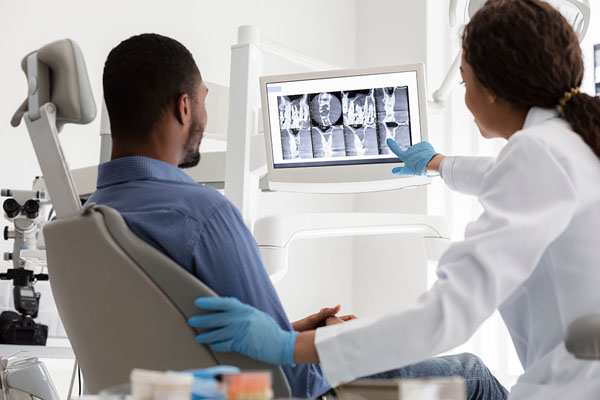Do You Deal With Jaw Pain?
TMJ disorders (TMD), also known as temporomandibular joint disorders, are a group of conditions that affect the jaw joint and surrounding muscles. These disorders can cause pain and discomfort in the jaw, face, head, and neck. They also limit jaw movement and affect the ability to chew, talk, and swallow.
If you deal with severe jaw pain, you may be suffering from TMD. Contact our Farmington dentist near you today to schedule an appointment by calling (505) 327-4863.

What Is the TMJ?
TMJ stands for temporomandibular joint. It’s the joint that connects your jawbone (mandible) to your skull, specifically to the temporal bone in the skull. This joint allows you to open and close your mouth, move your jaw from side to side, and chew food. The TMJ is one of the most frequently used joints in the body.
The TMJ is a complex joint with a combination of hinge and sliding motions. It’s surrounded by muscles, ligaments, and tendons that help control its movement. Problems with the TMJ can lead to a condition known as temporomandibular joint disorder (TMD) or temporomandibular disorder (TMD), which can cause chronic pain, discomfort, and difficulty with jaw movement.
Types of TMJ Disorders
There are several types of TMJ disorders, each with its own unique set of symptoms and causes. Some of the most common types of TMD include:
- Myofascial Pain Disorder: The most common type of TMJ disorder. It’s characterized by pain or discomfort in the muscles that control jaw movement. Various factors, including stress, overuse of the jaw muscles, and trauma to the temporomandibular joints, can cause myofascial pain.
- Internal Joint Derangement: A type of disorder that occurs when the disc that cushions the joint becomes displaced or dislocated, causing pain, clicking or popping sounds in the jaw, and limited jaw movement. Trauma to the joint, arthritis, or a misaligned bite can cause internal derangement.
- Degenerative Joint Disease: A disorder that occurs when the cartilage in the jaw joint wears away over time, leading to bone-on-bone contact, pain, and limited jaw movement. Degenerative joint disease can occur from aging, trauma to the joint, or other joint diseases.
- TMJ Ankylosis: A rare but serious TMJ disorder that occurs when the jaw joints become fused, preventing normal jaw movement. Trauma to the joints, infection, or certain medical conditions can cause TMJ ankylosis.
Causes of TMJ Disorders
The exact cause of temporomandibular disorders isn’t always clear, but the following factors may contribute to the development of the condition:
- Jaw injuries, such as a blow to the jaw or whiplash
- Developmental growth disturbances
- Grinding or clenching of the teeth, putting pressure on the jaw joint
- Arthritis or other joint diseases that affect the TMJ
- Dislocation or displacement of the disc that cushions the joint
- Stress or anxiety, which can cause muscle tension in the face and jaw
If you’re dealing with TMJ pain, contact our dentist in Farmington today at (505) 327-4863 to schedule an appointment.

TMJ Symptoms
The symptoms of TMJ disorders can vary depending on the severity of the condition. Some of the most common symptoms include:
- Pain or tenderness in the jaw joint, face, or ear
- Difficulty or pain when opening or closing the mouth
- Jaw clicking, popping, or grating sounds when opening or closing the mouth
- Aching pain in or around the ear
- Headaches, neck aches, or shoulder pain
- Difficulty chewing or biting
- Swelling on one side of the face
- Neck and facial pain
If you’re experiencing these signs of TMD, it may be time to schedule an appointment with our Farmington dentist, Dr. Schumacher, who has special emphasis training in TMJ disorders. We’ll examine your condition, recommend treatment, and help you understand what you shouldn’t do with TMD. Relieve TMJ symptoms today and find pain relief.
Risk Factors of Developing TMD
You may be at a higher risk of developing a temporomandibular joint disorder if you possess any of the following:
- Jaw injuries: Trauma to the jaw, from a car accident or sports injury, can increase the risk of developing TMD.
- Teeth grinding or clenching (bruxism): Habitual teeth grinding or clenching, often caused by stress or anxiety, can put excessive pressure on the jaw joint and surrounding muscles.
- Arthritis or other joint diseases: Conditions that cause inflammation or damage to the joints, such as osteoarthritis or rheumatoid arthritis, can increase the risk of TMD.
- Dislocation or displacement of the jaw joint disc: The jaw joint has a disc that helps cushion and stabilize it. If this disc becomes displaced or dislocated, it can cause TMJ symptoms.
- Genetics: Some people may be more genetically predisposed to developing TMD.
- Poor posture: Poor posture, particularly in the neck and shoulders, can contribute to muscle tension and pain in the jaw and surrounding areas.
- Gender: Women are more likely than men to develop TMJ disorders.
- Age: TMD is more common in people between the ages of 20 and 40, but it can occur at any age.
Diagnosing TMD
If you’re experiencing symptoms of TMD or TMJ pain, it’s crucial to seek medical attention from a dentist or doctor so it doesn’t go untreated. They’ll perform a thorough evaluation of your symptoms and medical history and may also perform a physical exam of your joint and surrounding facial muscles. In some cases, imaging tests such as a CBCT 3D X-ray (a “mini” CAT scan) or an MRI may be used to help diagnose the condition.

Conservative Treatment Options for TMD
Treatment for TMD depends on the severity of the condition and the underlying cause. In most cases, conservative, nonsurgical treatments are effective in relieving symptoms. The costs of TMJ therapy will vary from treatment to treatment.
These include:
- Resting the jaw by avoiding hard, crunchy, or chewy foods
- Applying heat or cold packs to the jaw
- Taking over-the-counter pain medications, such as ibuprofen or acetaminophen, to control pain
- Performing jaw exercises to improve flexibility and reduce tension
- Wearing orthotics, nightguards, or splints to reduce pressures on the teeth and jaw joints
- Physical therapy or massage therapy
- Taking muscle relaxants if prescribed by your doctor
- Practicing relaxation techniques to ease stress and control clenching
- Injection of Platelet Rich Fibrin or Platelet Rich Plasma into the TMJ to reduce inflammation and pain. This is called Regenerative TMJ Therapy, and it works very well in certain cases
If conservative temporomandibular disorder treatments aren’t effective, more invasive treatments may be necessary, such as:
- Dental procedures to correct misaligned teeth or replace missing teeth
- Surgery to repair or replace the TMJ joint. Most patients want to avoid costly surgery, and this is very rare in our office
Prevention of TMD
While some causes of TMD are beyond our control, there are several steps you can take to reduce your risk of developing the condition. Prevention tips include:
- “Lips together and teeth apart”-meaning breathing through your nose instead of your mouth and allowing your lower jaw to rest without the teeth touching
- Avoid chewing gum or biting your nails constantly
- Practice good posture and reduce stress to help prevent muscle tension in the face and jaw
- Wear a mouth guard or splint if you grind or clench your teeth
- Seek prompt medical attention if you experience any jaw pain or discomfort
Frequently Asked Questions
Botox (botulinum toxin) can help temporarily for some muscle-related TMJ disorders, but we like to treat the root causes of a patient’s condition, not just mask over the problem. No one has a TMJ-related problem that is caused by a deficiency of Botox.
Regenerative TMJ Therapy is a minimally invasive, biologically based treatment designed to help repair or regenerate damaged tissues in the TMJ. It targets damaged or degenerated TMJ cartilage and joint linings, small tears in the articular disc or capsule, and arthritic or chronically inflamed joints. Platelet Rich Fibrinogen (PRF) or Platelet Rich Plasma (PRP) is made from your own blood and injected into the joint to stimulate healing, reduce inflammation, and slow cartilage breakdown.
Think of using orthotics or nightguards as “crutches” to relieve pressure in the jaw joints and muscles, and the Regenerative PRF Therapy stimulates and accelerates your body’s natural healing.
Yes, in many patients, there can be symptoms of both that present together. We can screen you to identify if you have a sleep-related breathing disorder as well, and make proper recommendations.
Yes, TMJ disorder is a relatively common condition that affects millions of people worldwide. It’s more common in women than men and often affects people between the ages of 20 and 40.
The exact prevalence of TMD is difficult to determine because many people don’t seek medical attention for their symptoms or are misdiagnosed with other conditions. However, research suggests that up to 12 percent of the population may experience some form of TMD at some point in their lives.
Yes, children can develop TMJ disorders, although it’s less common than in adults. Some common causes of TMD in children include jaw injuries, misaligned teeth or jaws, and habits such as nail biting, gum chewing, or thumb sucking.
Usually not, but there are a few insurance companies that may help with partial reimbursement to you. We do offer third-party patient financing, such as Care Credit and Sunbit.
Yes, certain dietary factors can contribute to TMJ disorder:
- Eating hard or crunchy foods, such as nuts or popcorn, can put excessive strain on the joints and jaw muscles, exacerbating TMD symptoms.
- Chewing gum or eating chewy foods, such as candy or gumdrops, can also contribute to jaw pain and discomfort.
- Consuming foods high in sugar or caffeine can contribute to muscle tension and pain, which can worsen TMJ symptoms.
Call us for an initial exam with Dr. Schumacher, in which we will provide a working diagnosis and treatment recommendations for you.
Seek Soothing Relief for Jaw Pain
TMD can cause uncomfortable and painful symptoms that can negatively affect a person’s quality of life. However, with the right treatment plan, most people with TMJ disorders can manage their symptoms and improve their jaw function.
If you’re experiencing any symptoms of TMD, it’s critical to consult your dentist or doctor to determine the best course of action. For those in Farmington, schedule an appointment with our local dentist near you today by calling (505) 327-4863.
